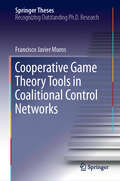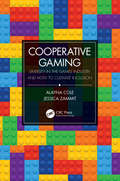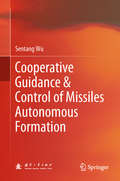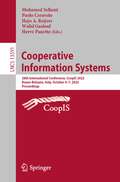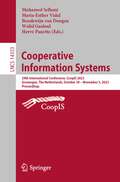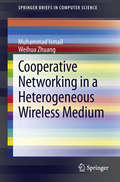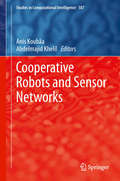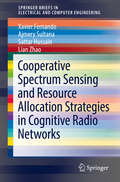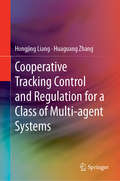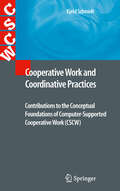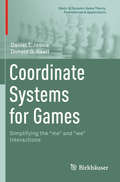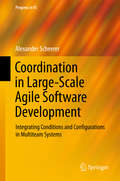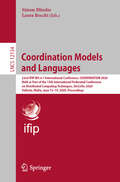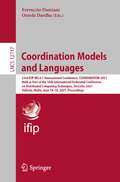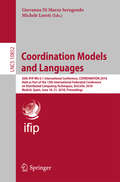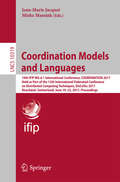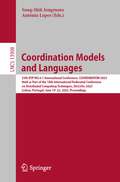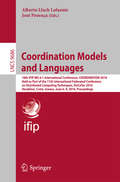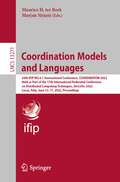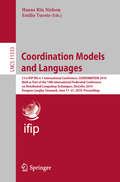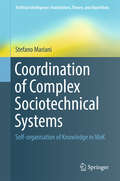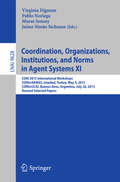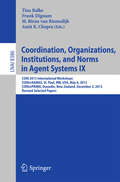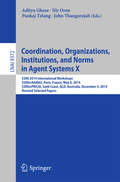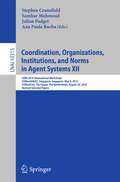- Table View
- List View
Cooperative Game Theory Tools in Coalitional Control Networks (Springer Theses)
by Francisco Javier MurosThis book analyzes coalitional control schemes by incorporating concepts of cooperative game theory into a distributed control framework. It considers a networked architecture where the nodes are the agents and the edges are their communication links and either the agents or the links are established as the players of cooperative games related to the cost function of the coalitional schemes. The book discusses various cooperative game theory tools that are used to measure/analyze the players’ features, impose constraints on them, provide alternative methods of game computation, detect critical players inside the control scheme, and perform system partitioning of large-scale systems, such as the Barcelona drinking water network, which is described in a case study.
Cooperative Gaming: Diversity in the Games Industry and How to Cultivate Inclusion (ERROR)
by Alayna Cole Jessica ZammitDescription Cooperative Gaming provides context and practical advice regarding diversity in the games industry. The book begins with a deep dive into research literature and the history of diversity in the games industry to provide context around what diversity is and why it is a topic worth considering. The book looks at the different facets of diversity and games, exploring the issues and solutions within game development, studio management, event planning, and more. It provides people with practical advice about being a marginalized person in the games industry and how to be heard, how studios can support inclusive practices, and events can actively become more accessible to a diverse audience. Key Features • Explores the history of diversity in games • Provides important information around what it is like to be a marginalized person in the industry • Gives practical steps to improve the inclusivity of the industry that are designed to aid in contextualizing and upskilling new developers Author Bios Alayna Cole is the managing director of Queerly Represent Me, a not-for-profit championing queer representation in games. Alayna is also a producer at Sledgehammer Games, co-chair of the IGDA LGBTQ+ special interest group, and an award-winning games journalist and game developer. She was featured on the 2016 and 2017 Develop Pacific 30 Under 30 lists and the 2017 and 2019 Develop Pacific Women in Games lists, and she has received several other accolades in the industry. Jessica Zammit started writing in 2013 for Start Select Media, and for the next five years she followed her interest in writing about representations of mental health, diversity, and particularly, sexuality in video games. Jessica has been speaking about diversity in games at conventions such as PAX Australia since 2016 and has been featured on several other discussions in and around the topic of representation in games and games criticism. Along with her co-author, she is co-chair of the IGDA LGBTQ+ special interest group, and she was featured on the 2018 Develop Pacific 30 Under 30 and Women in Games lists.
Cooperative Guidance & Control of Missiles Autonomous Formation
by Sentang WuThis book primarily illustrates the rationale, design and technical realization/verification for the cooperative guidance and control systems (CGCSs) of missile autonomous formation (MAF). From the seven functions to the five major compositions of CGCS, the book systematically explains the theory and modeling, analysis, synthesis and design of CGCSs for MAF, including bionics-based theories.Further, the book addresses how to create corresponding digital simulation analysis systems, as well as hardware in the loop (HIL) simulation test systems and flight test systems, to evaluate the combat effectiveness of MAF. Lastly, it provides detailed information on digital simulation analysis for a large range of wind tunnel test data, as well as test results of HIL system simulations and embedded systems testing.
Cooperative Information Systems: 28th International Conference, CoopIS 2022, Bozen-Bolzano, Italy, October 4–7, 2022, Proceedings (Lecture Notes in Computer Science #13591)
by Mohamed Sellami Paolo Ceravolo Hajo A. Reijers Walid Gaaloul Hervé PanettoThis volume LNCS 13591 constitutes the proceedings of the International Conference on Cooperative Information Systems, CoopIS 2022, collocated with the Enterprise Design, Operations and Computing conference, EDOC 2022, in October 2022 in Bozen-Bolzano, Italy. The 15 regular papers presented together with 5 research in progress papers were carefully reviewed and selected from 68 submissions. The conference focuses on technical, economical, and societal aspects of distributed information systems at scale. As said, this 28th edition was collocated with the 26th edition of the Enterprise Design, Operations and Computing conference, EDOC 2022, and its guiding theme was "Information Systems in a Digital World“.
Cooperative Information Systems: 29th International Conference, CoopIS 2023, Groningen, The Netherlands, October 30–November 3, 2023, Proceedings (Lecture Notes in Computer Science #14353)
by Mohamed Sellami Maria-Esther Vidal Boudewijn Van Dongen Walid Gaaloul Hervé PanettoThis book constitutes the refereed proceedings of the 29th International Conference on Cooperative Information Systems, CoopIS 2023, held in Groningen, The Netherlands, during October 30–November 3, 2023. The 21 regular papers and 10 work-in-progress papers included in this book were carefully reviewed and selected from 100 submissions. They were organized in topical sections as follows: Knowledge Engineering; Deployment and Migration in CISs; Security and Privacy in CISs; Process Modeling; Process Analytics; Human Aspects and Social Interaction in CISs; and Work in Progress.
Cooperative Networking in a Heterogeneous Wireless Medium (SpringerBriefs in Computer Science)
by Weihua Zhuang Muhammad IsmailThis brief focuses on radio resource allocation in a heterogeneous wireless medium. It presents radio resource allocation algorithms with decentralized implementation, which support both single-network and multi-homing services. The brief provides a set of cooperative networking algorithms, which rely on the concepts of short-term call traffic load prediction, network cooperation, convex optimization, and decomposition theory. In the proposed solutions, mobile terminals play an active role in the resource allocation operation, instead of their traditional role as passive service recipients in the networking environment.
Cooperative Robots and Sensor Networks (Studies in Computational Intelligence #507)
by Anis Koubâa Abdelmajid KhelilMobile robots and Wireless Sensor Networks (WSNs) have enabled great potentials and a large space for ubiquitous and pervasive applications. Robotics and WSNs have mostly been considered as separate research fields and little work has investigated the marriage between these two technologies. However, these two technologies share several features, enable common cyber-physical applications and provide complementary support to each other. The primary objective of book is to provide a reference for cutting-edge studies and research trends pertaining to robotics and sensor networks, and in particular for the coupling between them. The book consists of five chapters. The first chapter presents a cooperation strategy for teams of multiple autonomous vehicles to solve the rendezvous problem. The second chapter is motivated by the need to improve existing solutions that deal with connectivity prediction, and proposed a genetic machine learning approach for link-quality prediction. The third chapter presents an architecture for indoor navigation using an Android smartphone for guiding a variety of users, from sighted to the visually impaired, to their intended destination. In chapter four, the authors deal with accurate prediction modeling of ocean currents for underwater glider navigation. In chapter five, the authors discuss the challenges and limitations of RSS-based localization mechanisms and propose, EasyLoc, an autonomous and practical RSS-based localization technique that satisfies ease of deployment and implementation.
Cooperative Spectrum Sensing and Resource Allocation Strategies in Cognitive Radio Networks (SpringerBriefs in Electrical and Computer Engineering)
by Lian Zhao Sattar Hussain Ajmery Sultana Xavier FernandoCognitive radio networks (CRN) will be widely deployed in the near future, and this SpringerBrief covers some important aspects of it, as well as highlighting optimization strategies in Resource Allocation and Spectrum Sensing in CRNs. The cognitive approach in radio access is introduced in the first part of this SpringerBrief, and then next the benefits of cooperative spectrum sensing are highlighted and a framework for studying it under realistic channel conditions is described. New exact closed-form expressions for average false alarm probability and average detection probability are derived in this scenario. A novel approximation to alleviate the computational complexity of the proposed models are also discussed.Once the spectrum opportunities are identified, efficient and systematic resource allocation (RA) shall be performed. The second part of this SpringerBrief describes the taxonomy for the RA process in CRN. A comprehensive overview of the optimization strategies of the CRN RA is also provided. The device-to-device (D2D) communication scenario is discussed, then as a case study and various optimization strategies for the application of the CR technology in the D2D realm is studied. The application of advanced geometric water-filling (GWF) approach in CRN D2D environment for optimum resource allocation is presented in detail. Numerical results provide more insight quantitatively. Overall, this book is suitable for a wide audience that include students, faculty and researchers in wireless communication area and professionals in the wireless service industry.
Cooperative Tracking Control and Regulation for a Class of Multi-agent Systems
by Hongjing Liang Huaguang ZhangThis book focuses on the characteristics of cooperative control problems for general linear multi-agent systems, including formation control, air traffic control, rendezvous, foraging, role assignment, and cooperative search. On this basis and combined with linear system theory, it introduces readers to the cooperative tracking problem for identical continuous-time multi-agent systems under state-coupled dynamics; the cooperative output regulation for heterogeneous multi-agent systems; and the optimal output regulation for model-free multi-agent systems. In closing, the results are extended to multiple leaders, and cooperative containment control for uncertain multi-agent systems is addressed. Given its scope, the book offers an essential reference guide for researchers and designers of multi-agent systems, as well as a valuable resource for upper-level undergraduate and graduate students.
Cooperative Work and Coordinative Practices: Contributions to the Conceptual Foundations of Computer-Supported Cooperative Work (CSCW) (Computer Supported Cooperative Work)
by Kjeld SchmidtInformation technology has been used in organisational settings and for organisational purposes such as accounting, for a half century, but IT is now increasingly being used for the purposes of mediating and regulating complex activities in which multiple professional users are involved, such as in factories, hospitals, architectural offices, and so on. The economic importance of such coordination systems is enormous but their design often inadequate. The problem is that our understanding of the coordinative practices for which these systems are developed is deficient, leaving systems developers and software engineers to base their designs on commonsensical requirements analyses. The research reflected in this book addresses these very problems. It is a collection of articles which establish a conceptual foundation for the research area of Computer-Supported Cooperative Work.
Coordinate Systems for Games: Simplifying the "me" and "we" Interactions (Static & Dynamic Game Theory: Foundations & Applications)
by Daniel T. Jessie Donald G. SaariThis monograph develops a method of creating convenient coordinate systems for game theory that will allow readers to more easily understand, analyze, and create games at various levels of complexity. By identifying the unique characterization of games that separates the individual’s strategic interests from the group’s collective behavior, the authors construct a single analytical methodology that readers will be able to apply to a wide variety of games. With its emphasis on practicality and approachability, readers will find this book an invaluable tool, and a viable alternative to the ad hoc analytical approach that has become customary for researchers utilizing game theory.The introductory chapters serve two important purposes: they review several games of fundamental importance, and also introduce a dynamic that is inherent in games, but has gone unexplored until now. After this has been established, readers will advance from simple 2 x 2 games to games with more player strategies and dynamics. For interested readers, a rigorous treatment of the underlying mathematics is conveniently gathered at the end of the book. Additional topics of interest, such as extensive form and coalitional games, are presented to help readers visualize more complex settings that will be vital in aiding the understanding of advanced topics, such as coalition-free Nash points, multi-player repeated games, and more.Coordinate Systems for Games is ideal for a wide variety of researchers interested in game theory, including social scientists, economists, mathematicians, computer scientists, and more. The authors' approachable style also makes this accessible to an audience at any scale of experience, from beginning non-specialists to more practiced researchers.
Coordination in Large-Scale Agile Software Development: Integrating Conditions and Configurations in Multiteam Systems (Progress in IS)
by Alexander ScheererThis book explores coordination within and between teams in the context of large-scale agile software development, providing readers a deeper understanding of how coordinated action between teams is achieved in multiteam systems. An exploratory multiple case study with five multiteam systems and a total of 66 interviewees from development teams at SAP SE is presented and analyzed. In addition, the book explores stereotypes of coordination in large-scale agile settings and shares new perspectives on integrating conditions for coordination. No previous study has researched this topic with a similar data set, consisting of insights from professional software development teams. As such, the book will be of interest to all researchers and practitioners whose work involves software product development across several teams.
Coordination Models and Languages: 22nd IFIP WG 6.1 International Conference, COORDINATION 2020, Held as Part of the 15th International Federated Conference on Distributed Computing Techniques, DisCoTec 2020, Valletta, Malta, June 15–19, 2020, Proceedings (Lecture Notes in Computer Science #12134)
by Simon Bliudze Laura BocchiThis book constitutes the proceedings of the 22nd International Conference on Coordination Models and Languages, COORDINATION 2020, which was due to be held in Valletta, Malta, in June 2020, as part of the 15th International Federated Conference on Distributed Computing Techniques, DisCoTec 2020. The conference was held virtually due to the COVID-19 pandemic.The 12 full papers and 6 short papers included in this volume were carefully reviewed and selected from 30 submissions. They are presented in this volume together with 2 invited tutorials and 4 tool papers. The papers are organized in the following topical sections: tutorials; coordination languages; message-based communication; communications: types & implementations; service-oriented computing; large-scale decentralized systems; smart contracts; modelling; verification & analysis.
Coordination Models and Languages: 23rd IFIP WG 6.1 International Conference, COORDINATION 2021, Held as Part of the 16th International Federated Conference on Distributed Computing Techniques, DisCoTec 2021, Valletta, Malta, June 14–18, 2021, Proceedings (Lecture Notes in Computer Science #12717)
by Ferruccio Damiani Ornela DardhaThis book constitutes the refereed proceedings of the 23rd IFIP WG 6.1 International Conference on Coordination Models and Language, COORDINATION 2021, held in Valletta, Malta, in June 2021, as part of the 16th International Federated Conference on Distributed Computing Techniques, DisCoTec 2021.The 15 regular papers, 2 short papers, and 1 tutorial paper presented in this book were carefully reviewed and selected from 31 submissions. COORDINATION provides a well-established forum for the growing community of researchers interested in coordination models and languages, architectures, verification and implementation techniques necessary to cope with the complexity induced by the demands of today's software development. The tool papers describe experience reports, technological artefacts, and innovative prototypes, as well as educational tools in the scope of the research topics of the conference. Due to the Corona pandemic this event was held virtually.
Coordination Models and Languages: 20th IFIP WG 6.1 International Conference, COORDINATION 2018, Held as Part of the 13th International Federated Conference on Distributed Computing Techniques, DisCoTec 2018, Madrid, Spain, June 18-21, 2018. Proceedings (Lecture Notes in Computer Science #10852)
by Giovanna Di Marzo Serugendo Michele LoretiThis book constitutes the proceedings of the 20th International Conference on Coordination Models and Languages, COORDINATION 2018, held in Madrid, Spain, in June 2018, as part of the 13th International Federated Conference on Distributed Computing Techniques, DisCoTec 2018.The 12 full papers included in this volume were carefully reviewed and selected from 26 submissions. The papers cover a wide range of topics and techniques related to system coordination, including: actor-based coordination, tuple- based coordination, agent-oriented techniques, constraints- based coordination, and finally coordination based on shared spaces.
Coordination Models and Languages: 19th IFIP WG 6.1 International Conference, COORDINATION 2017, Held as Part of the 12th International Federated Conference on Distributed Computing Techniques, DisCoTec 2017, Neuchâtel, Switzerland, June 19-22, 2017, Proceedings (Lecture Notes in Computer Science #10319)
by Jean-Marie Jacquet Mieke MassinkModern information systems rely increasingly on combining concurrent, d- tributed, mobile, recon?gurable and heterogenous components. New models, architectures, languages, and veri?cation techniques are therefore necessary to cope with the complexity induced by the demands of today's software devel- ment. Coordination languages have emerged as a successful approach, providing abstractions that cleanly separate behavior from communication and therefore increasing modularity, simplifying reasoning, and ultimately enhancing software development. This volume contains the proceedings of the 7th International Conference on Coordination Models and Languages (Coordination 2005), held at the Ins- tute of Informatics of the University of Namur, Belgium, on April 20-23, 2005. The previous conferences in this series took place in Cesena (Italy), Berlin (G- many), Amsterdam(TheNetherlands), Limassol(Cyprus), York(UK), andPisa (Italy). Building upon the success of these events, Coordination 2005 provided a forum for the community of researchers interested in models, languages, and implementation techniques for coordination and component-based software, as well as applications that exploit them. The conference attracted 88 submissions from authors all over the world.
Coordination Models and Languages: 25th IFIP WG 6.1 International Conference, COORDINATION 2023, Held as Part of the 18th International Federated Conference on Distributed Computing Techniques, DisCoTec 2023, Lisbon, Portugal, June 19–23, 2023, Proceedings (Lecture Notes in Computer Science #13908)
by Sung-Shik Jongmans Antónia LopesThis book constitutes the refereed proceedings of the 25th IFIP WG 6.1 International Conference on Coordination Models and Language, COORDINATION 2023, held in Lisbon, Portugal, in June 2023, as part of the 18th International Federated Conference on Distributed Computing Techniques, DisCoTec 2023. The 12 regular papers and 2 short paper presented in this book were carefully reviewed and selected from 27 submissions.The papers deal with the following topics: Collective Adaptive Systems and Aggregate Computing; Cyber-Physical Systems; Verification and Testing; Languages and Processes; and Run-Time Changes.
Coordination Models and Languages: 18th IFIP WG 6.1 International Conference, COORDINATION 2016, Held as Part of the 11th International Federated Conference on Distributed Computing Techniques, DisCoTec 2016, Heraklion, Crete, Greece, June 6-9, 2016, Proceedings (Lecture Notes in Computer Science #9686)
by Alberto Lluch Lafuente José ProençaThis book constitutes the proceedings of the 18th International Conference on Coordination Models and Languages, COORDINATION 2016, held in Heraklion, Crete, Greece, in June 2016, as part of the 11th International Federated Conference on Distributed Computing Techniques, DisCoTec 2016. The 16 full papers included in this volume were carefully reviewed and selected from 44 submissions. The papers cover a wide range of topics and techniques related to system coordination, including: programming and communication abstractions; communication protocols and behavioural types; actors and concurrent objects; tuple spaces; games, interfaces and contracts; information flow policies and dissemination techniques; and probabilistic models and formal verification.
Coordination Models and Languages: 24th IFIP WG 6.1 International Conference, COORDINATION 2022, Held as Part of the 17th International Federated Conference on Distributed Computing Techniques, DisCoTec 2022, Lucca, Italy, June 13-17, 2022, Proceedings (Lecture Notes in Computer Science #13271)
by Maurice H. ter Beek Marjan SirjaniThis book constitutes the refereed proceedings of the 24th IFIP WG 6.1 International Conference on Coordination Models and Language, COORDINATION 2022, held in Lucca, Italy, in June 2022, as part of the 17th International Federated Conference on Distributed Computing Techniques, DisCoTec 2022. The 11 regular papers and one short paper presented in this book were carefully reviewed and selected from 22 submissions. COORDINATION provides a well-established forum for the growing community of researchers interested in coordination models and languages, architectures, verification and implementation techniques necessary to cope with the complexity induced by the demands of today's software development.
Coordination Models and Languages: 21st IFIP WG 6.1 International Conference, COORDINATION 2019, Held as Part of the 14th International Federated Conference on Distributed Computing Techniques, DisCoTec 2019, Kongens Lyngby, Denmark, June 17–21, 2019, Proceedings (Lecture Notes in Computer Science #11533)
by Hanne Riis Nielson Emilio TuostoThis book constitutes the proceedings of the 21th International Conference on Coordination Models and Languages, COORDINATION 2019, held in Kongens Lyngby, Denmark, in June 2019, as part of the 14th International Federated Conference on Distributed Computing Techniques, DisCoTec 2019. The 15 full papers included in this volume were carefully reviewed and selected from 25 submissions. The papers are organized in topical sections named: computational models; tools; exploring new frontiers; and coordination patterns.
Coordination of Complex Sociotechnical Systems: Self-organisation of Knowledge in MoK (Artificial Intelligence: Foundations, Theory, and Algorithms)
by Stefano MarianiThe book discusses the main issues of coordination in complex sociotechnical systems, covering distributed, self-organising, and pervasive systems. A chemistry-inspired model of coordination, a situated architecture and coordination language, and a cognitive model of interaction are the ingredients of the Molecules of Knowledge (MoK) model for self-organisation of knowledge presented in this book. The MoK technology is discussed, along with some case studies in the fields of collaborative systems, academic research, and citizen journalism. The target audience includes researchers and practitioners in the field of complex software systems engineering. The book is also appropriate for graduate and late undergraduate students in computer science and engineering.
Coordination, Organizations, Institutions, and Normes in Agent Systems XI: COIN 2015 International Workshops, COIN@AAMAS, Istanbul, Turkey, May 4, 2015, COIN@IJCAI, Buenos Aires, Argentina, July 26, 2015, Revised Selected Papers (Lecture Notes in Computer Science #9628)
by Virginia Dignum Pablo Noriega Murat Sensoy Jaime Simão Simão SichmanThis book constitutes the thoroughly refereed post-conference proceedings of the 11th International Workshops on Coordination, Organizations, Institutions and Norms in Agent Systems, COIN 2015. The workshops were co-located with AAMAS 2015, held in Istanbul, Turkey, in May 2015, and with IJCAI 2015, held in Buenos Aires, Argentina, in July 2015. The 23 full papers were carefully reviewed and selected from 46 initial submissions for inclusion in this volume. The papers cover a wide range of topics from work on formal aspects of normative and team based systems, to software engineering with organizational concepts, to applications of COIN based systems, and to philosophical issues surrounding socio-technical systems. They highlight not only the richness of existing work in the field, but also point out the challenges and exciting research that remains to be done in the area.
Coordination, Organizations, Institutions, and Norms in Agent Systems IX: COIN 2013 International Workshops, COIN@AAMAS, St. Paul, MN, USA, May 6, 2013, COIN@PRIMA, Dunedin, New Zealand, December 3, 2013, Revised Selected Papers (Lecture Notes in Computer Science #8386)
by Tina Balke, Frank Dignum, M. Birna Riemsdijk and Amit K. ChopraThis book constitutes the thoroughly refereed proceedings of the 9th International Workshops on Coordination, Organizations, Institutions and Norms in Agent Systems, COIN 2013. The workshops were co-located with AAMAS 2013, held in St. Paul, MN, USA in May 2013, and with PRIMA 2013, held in Dunedin, New Zealand, in December 2013. The 18 full papers were carefully reviewed and selected from 28 submissions and are presented together with two invited papers. The papers are organized in topical sections such as coordination, organizations, institutions, norms, norm conflict, and norm-aware agents.
Coordination, Organizations, Institutions, and Norms in Agent Systems X: COIN 2014 International Workshops, COIN@AAMAS, Paris, France, May 6, 2014, COIN@PRICAI, Gold Coast, QLD, Australia, December 4, 2014, Revised Selected Papers (Lecture Notes in Computer Science #9372)
by Aditya Ghose Nir Oren Pankaj Telang John ThangarajahThis book constitutes the thoroughly refereed post-conference proceedings of the 10th International Workshops on Coordination, Organizations, Institutions and Norms in Agent Systems, COIN 2014. The workshops were co-located with AAMAS 2014, held in Paris, France, in May 2014, and with PRICAI 2014, held in Gold Coast, QLD, Australia, in December 2014. The 16 full papers were carefully reviewed and selected for inclusion in this volume. The papers cover a wide range of topics from work on formal aspects of normative and team based systems, to software engineering with organisational concepts, to applications of COIN based systems, and to philosophical issues surrounding socio-technical systems. They highlight not only the richness of existing work in the field, but also point out the challenges and exciting research that remains to be done in the area.
Coordination, Organizations, Institutions, and Norms in Agent Systems XII: COIN 2016 International Workshops, COIN@AAMAS, Singapore, Singapore, May 9, 2016, COIN@ECAI, The Hague, The Netherlands, August 30, 2016, Revised Selected Papers (Lecture Notes in Computer Science #10315)
by Julian Padget Ana Paula Rocha Stephen Cranefield Samhar MahmoudThis book constitutes the thoroughly refereed post-conference proceedings of the 12th International Workshops on Coordination, Organizations, Institutions and Norms in Agent Systems, COIN 2016. The workshop COIN@AAMAS 2016 was held in Singapore, Singapore, in May 2016, and the workshop COIN@ECAI 2016 was held in The Hague, The Netherlands, in August 2016. The 9 full papers were carefully reviewed and selected from 15 submissions for inclusion in this volume. They cover the following topics:Social Issues: The papers focus on the security of personal data, support for self-care for individuals with chronic conditions, analysis of the risk of information leakage in social networks, and an analysis of issues arising in the design of on-line environments whose participants are human and software. Teams: The papers consider different aspects of team working: what kinds of knowledge sharing best contribute to effective team performance and how to organize a tea m to function effectively in different kinds of scenarios. Rights and Values: The papers examine complementary issues that influence the effective design of normative systems, namely how to detect opportunism so that it may be discouraged, how individuals values influence (collective) decision-making processes and how rights and powers relate to value and conflict resolution in nested organizational structures.
